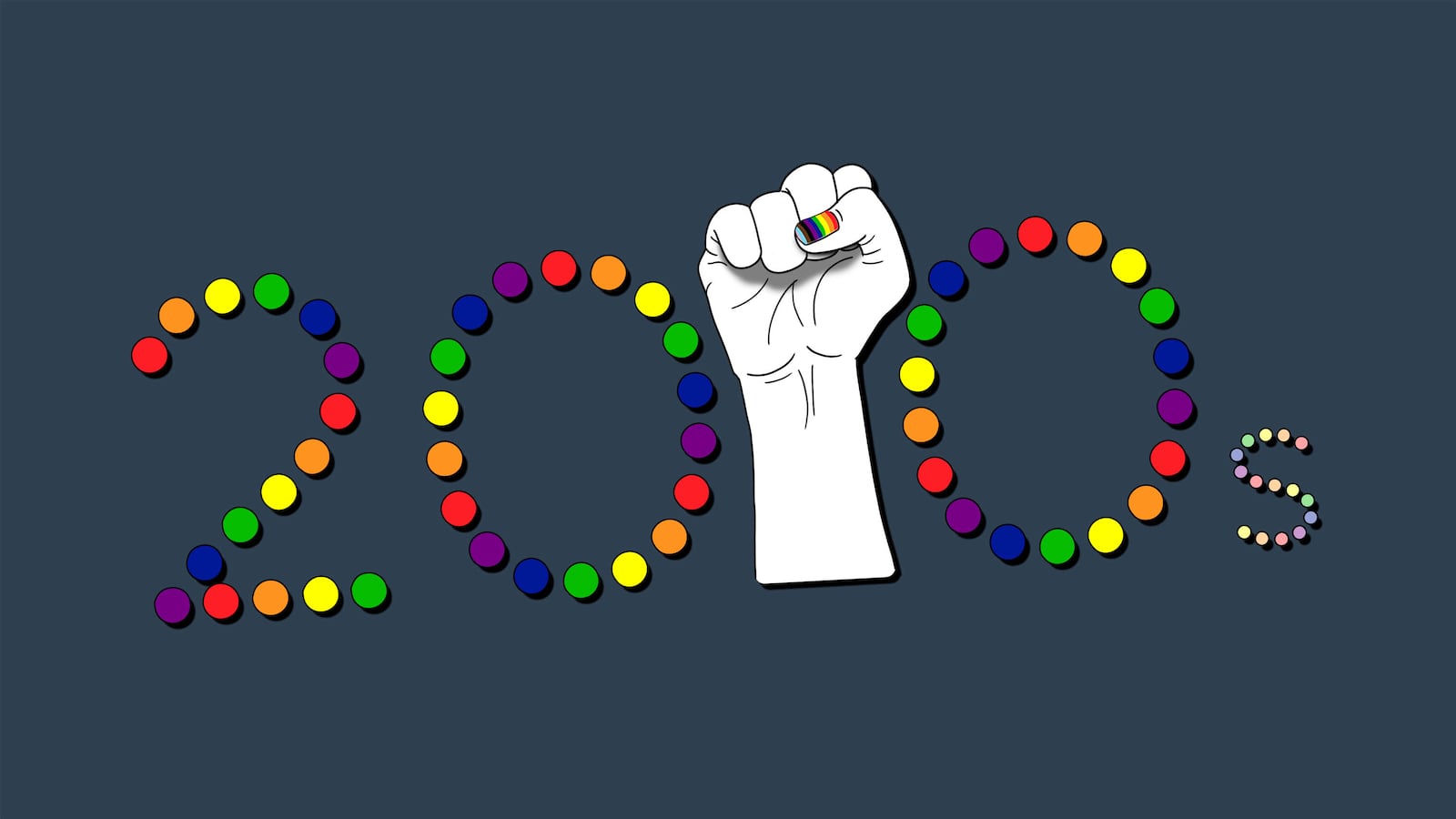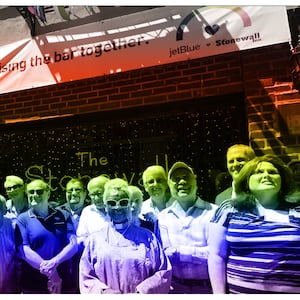How has the last decade felt if you’re an LGBTQ American? Well, it’s been 10 years of battling—plus ça change—in two very different political climates. The years of progress under President Obama segued to a much more unnerving state of affairs under President Trump. Meanwhile, there are pieces of pop culture—in music, movies, and TV shows like Pose, Gentleman Jack, Work in Progress, and Years and Years—showing an increasing diversity of LGBTQ lives and representation.
This year marked the 50th anniversary of the Stonewall Riots, and a chance to marvel at how far LGBTQ people have come since the days when homosexuality was a crime, when LGBTQ people lived lives of relative invisibility, and when LGBTQ people in 1969—including well-known names like Marsha P. Johnson and Sylvia Rivera—stood up against that.
The anniversary was also bittersweet, occurring at a time when LGBTQ rights and equality are under assault by the present administration. It reminded us that 50 years of struggle was far from over, even if—as the Stonewall 50 celebrations also vividly showed—we live in a time of increasing confidence, openness, acceptance, and varied self-definition.
In Pete Buttigieg, whatever you think of him, there is the bald fact of a gay man running for president, and the important moment in history that marks. Danica Roem made history first in 2017 by becoming the first-ever out transgender state legislator, when she was elected to represent the 13th District in the Virginia House of Delegates. This year, Roem made history again as the first out trans person to be re-elected to a state legislature.
In 2018, Kyrsten Sinema became the first out bisexual senator (in Arizona), and Jared Polis became the first openly gay man to be elected governor of a U.S. state (Colorado). Some 80 LGBTQ candidates won their races in this November's elections.
At the same time as these signs of progress, the Supreme Court is considering whether it should be OK to fire someone because they are gay or transgender, and trans people find themselves banned from joining the armed forces under President Trump's discriminatory policy, which is still being challenged in the courts.
How has the last decade been if you’re LGBTQ? Seriously weird, since you ask. Elation, fury, desperation, celebration, grief, cheer, and desolation have proven close neighbors.
The Trump administration is apparently determined to do all it can, through legislation and the courts, to stall and reverse the gains made on the road to LGBTQ equality.
Although it feels like another time, the decade began with continued agonizing over Proposition 8, which was passed in California in 2008 and which overturned that state’s ruling the previous May that had legalized gay marriage. (Marriage equality eventually became law in California in 2013.)
The decade also began with the headline-generating suicide of Rutgers student Tyler Clementi in September 2010, whose mother Jane described to me in 2017 what the effect of his death had been on her family, as well as the many issues it raised around bullying, privacy, mental health, and coming out.
An awful, larger-scale tragedy erupted when 49 people were killed and 53 injured when a gunman opened fire at an Orlando LGBTQ nightclub, Pulse, in June 2016.
The decade ended with the interring of Matthew Shepard’s ashes (in 2018) and the unveiling of a plaque earlier this month at Washington’s National Cathedral. His parents Judy and Dennis recently described to me how it felt to know he was finally “safe,” and voiced their disgust with President Trump. The battle to outlaw conversion therapy continues, state by state.
Politically, the last 10 years in American LGBTQ politics began with marriage equality as a red-button pivot, motivating activists pro and anti. The result was a win for equality, even if—under Trump—its hangover and practical and ideological remnants are still being contested by anti-LGBTQ groups keen to scupper its import.
Obama had undergone his own “evolution” around LGBTQ rights, which frustrated many at the time—even if he eventually reached the right destination. Following a momentous SCOTUS ruling, marriage equality was finally legalized nationwide in 2015; the Obama White House was wreathed in the colors of the rainbow that June evening to mark both the key civil-rights victory and Pride month.
But ever since Trump’s election, the victory and meaning of marriage equality—so hard fought, and a brilliant achievement—has become imperiled, alongside other LGBTQ rights and protections.
Justice Anthony Kennedy, who wrote the searingly-phrased ruling in the case of Obergefell v. Hodges, has retired. He was also the deciding vote in the key LGBT-focused SCOTUS cases of Romer v. Evans, Lawrence v. Texas, and Windsor v. the United States, culminating in the striking down in 2013 of the discriminatory section of the Defense of Marriage Act, with the inspirational Edie Windsor as its figurehead. Windsor’s funeral in September 2017 was the best send-off for an amazing woman.
President Trump has filled the Supreme Court’s empty spots with conservative justices: Neil Gorsuch and Brett Kavanaugh. Conservative justices are being installed in lower courts. The fiercely religious Vice President Mike Pence has long made clear his animus to the LGBTQ community, and now has unprecedented power in the Trump political kingdom.
The Supreme Court this autumn heard three historic LGBTQ-related discrimination cases, covered extensively by The Daily Beast; we shall see if a conservative-tilting Supreme Court thinks it is fair to be able to fire somebody because of their sexual orientation and gender identity.
Read that sentence again: this is something that is actually up for serious debate. LGBTQ people are literally fighting for their right to do their jobs without fear of being fired for who they are. The Equality Act, which would afford LGBTQ workers equal protections, is extremely unlikely to get passed in this Republican-controlled Senate.
Those opposed to LGBTQ equality have a new buzz-phrase to march behind: religious liberty. The White House has chosen this insidious scythe to chop away at not just marriage equality but also other equality and anti-discrimination measures and protections. GLAAD keeps a running tally, now in its hundreds, of these assaults on equality by the Trump administration.
Jim Obergefell himself wrote for Time, “With Kennedy’s retirement, I am concerned that the backlash is going to turn into a complete ripping away of every bit of equality—every bit of progress—we’ve made over these decades.”
“Religious liberty,” as evidenced most infamously in the Masterpiece Cakeshop case, posits that it is fine to not marry gay people, or serve them in shops, or afford them equality of treatment when it comes to adoption and fostering if you, as a religious person, disapprove of them. Sessions even set up the Orwellian-sounding Religious Liberty Task Force to search out, and help, all those who feel their “religious liberties” and “religious freedoms” were being trespassed upon by having to treat LGBT people equally.
These cases keep coming, and the attacks on LGBT people, using “religious liberty” as a pretext, has coincided with a period of pronounced anti-transgender prejudice.
As well as Trump’s military ban, states like Texas have tried to pass ‘bathroom bans,’ which seek to regulate where trans people can and cannot use toilets in public. Fortunately, the lower courts have so far ruled against such bans (as in the case of Gavin Grimm), and the dehumanizing discrimination they enshrine. (Indeed, the lower courts have generally been a protector of LGBTQ rights. Time will tell if that will continue.)
Trans people—many of them black women—are being murdered and are victims of violence, a crime phenomenon that oddly doesn’t seem to bother those law and order-obsessed conservatives who have instead sought to make trans’ people’s lives so miserable and legally curtailed.
Still, homophobia and transphobia are challenged more, and in politics even the most prejudiced politician—as Roy Moore discovered in Alabama in 2017 when he lost to Doug Jones—cannot rely on bigotry to win votes.
Abroad, we have witnessed both the violence and extreme discrimination practiced against LGBTQ people—and their brave struggles for equality—in countries including Russia, Uganda, and Iraq.
If the LGBTQ hope of the Obama era has dissipated when it comes to this country’s legislators, in pop culture progress is being made in terms of LGBTQ representation and presence. The cultural dial moves forward, even as the political one goes into a negative stasis.
There are still not enough stories and LGBTQ faces—but in the last decade the characters and stories have kept coming on the big screen, as in the Oscar-winning Moonlight and Call Me By Your Name, with lesbian sexuality explored in movies including Blue is the Warmest Color, Portrait of a Lady on Fire, and Carol.
LGBTQ characters and stories are embedded in network and cable TV shows too, in shows as diverse as Transparent, Orange is the New Black, A Very British Scandal, and the returning L Word: Generation Q. We even have ‘Teriah’ on The Young and the Restless.
On stage, black queer playwrights have broken through via plays like Jeremy O'Harris’ smash Slave Play, Michael R. Jackson’s A Strange Loop, and Tarell Alvin McCraney’s Choir Boy. The gay-themed epic The Inheritance by Matthew Lopez is on Broadway (to mixed reviews). Classic gay plays Angels in America, The Boys in the Band, and Torch Song Trilogy made high-profile returns to Broadway.
There are more out celebrities and public figures, including Apple CEO Tim Cook, who came out in 2014. Pop stars and public figures have challenged binaries and boundaries of gender and sexuality (note pop star Sam Smith's embrace of non-binary as a self-descriptor).
There is the heartening energy of LGBTQ campaigners of many ages and experiences. The range of voices speaking out is growing more diverse.
In June, New York City accommodated two processions on Pride day—one the World Pride march, with its colorful floats and millions of spectators. But there was also the Queer Liberation March, which did a fantastic job of including so many different communities and maintained a focus on activism. Both marches were their own successes, proving that any community's diversity—and recognizing the same—is a strength rather than weakness.
As Obergefell wrote for Time: “I’m not just worried about the LGBTQ community. I’m scared for women’s rights, for voting rights. I’m scared for every marginalized group in this nation who relies upon the Supreme Court to live up to those four words etched into the building’s western pediment: Equal Justice Under Law.”
As 2020 dawns, the LGBTQ fight goes on, as it will until full equality is reached. Under Trump and Pence, the stakes have never felt higher.







